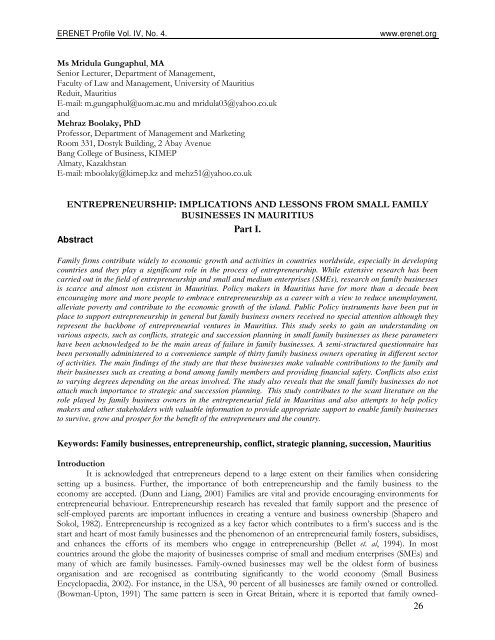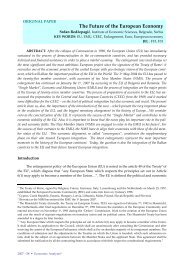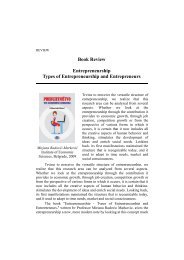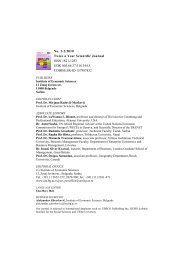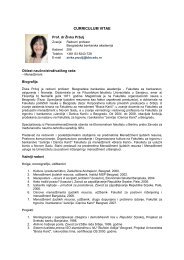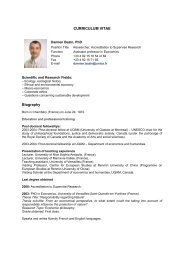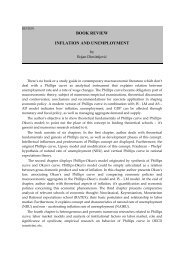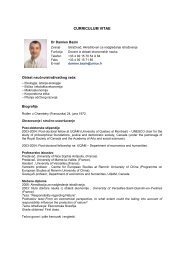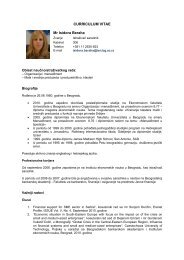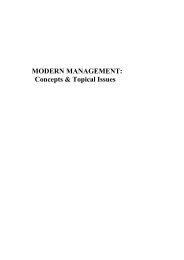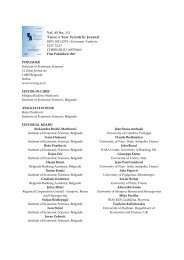Issue 16
Issue 16
Issue 16
Create successful ePaper yourself
Turn your PDF publications into a flip-book with our unique Google optimized e-Paper software.
ERENET Profile Vol. IV, No. 4.<br />
www.erenet.org<br />
Ms Mridula Gungaphul, MA<br />
Senior Lecturer, Department of Management,<br />
Faculty of Law and Management, University of Mauritius<br />
Reduit, Mauritius<br />
E-mail: m.gungaphul@uom.ac.mu and mridula03@yahoo.co.uk<br />
and<br />
Mehraz Boolaky, PhD<br />
Professor, Department of Management and Marketing<br />
Room 331, Dostyk Building, 2 Abay Avenue<br />
Bang College of Business, KIMEP<br />
Almaty, Kazakhstan<br />
E-mail: mboolaky@kimep.kz and mehz51@yahoo.co.uk<br />
ENTREPRENEURSHIP: IMPLICATIONS AND LESSONS FROM SMALL FAMILY<br />
BUSINESSES IN MAURITIUS<br />
Part I.<br />
Abstract<br />
Family firms contribute widely to economic growth and activities in countries worldwide, especially in developing<br />
countries and they play a significant role in the process of entrepreneurship. While extensive research has been<br />
carried out in the field of entrepreneurship and small and medium enterprises (SMEs), research on family businesses<br />
is scarce and almost non existent in Mauritius. Policy makers in Mauritius have for more than a decade been<br />
encouraging more and more people to embrace entrepreneurship as a career with a view to reduce unemployment,<br />
alleviate poverty and contribute to the economic growth of the island. Public Policy instruments have been put in<br />
place to support entrepreneurship in general but family business owners received no special attention although they<br />
represent the backbone of entrepreneurial ventures in Mauritius. This study seeks to gain an understanding on<br />
various aspects, such as conflicts, strategic and succession planning in small family businesses as these parameters<br />
have been acknowledged to be the main areas of failure in family businesses. A semi-structured questionnaire has<br />
been personally administered to a convenience sample of thirty family business owners operating in different sector<br />
of activities. The main findings of the study are that these businesses make valuable contributions to the family and<br />
their businesses such as creating a bond among family members and providing financial safety. Conflicts also exist<br />
to varying degrees depending on the areas involved. The study also reveals that the small family businesses do not<br />
attach much importance to strategic and succession planning. This study contributes to the scant literature on the<br />
role played by family business owners in the entrepreneurial field in Mauritius and also attempts to help policy<br />
makers and other stakeholders with valuable information to provide appropriate support to enable family businesses<br />
to survive, grow and prosper for the benefit of the entrepreneurs and the country.<br />
Keywords: Family businesses, entrepreneurship, conflict, strategic planning, succession, Mauritius<br />
Introduction<br />
It is acknowledged that entrepreneurs depend to a large extent on their families when considering<br />
setting up a business. Further, the importance of both entrepreneurship and the family business to the<br />
economy are accepted. (Dunn and Liang, 2001) Families are vital and provide encouraging environments for<br />
entrepreneurial behaviour. Entrepreneurship research has revealed that family support and the presence of<br />
self-employed parents are important influences in creating a venture and business ownership (Shapero and<br />
Sokol, 1982). Entrepreneurship is recognized as a key factor which contributes to a firm’s success and is the<br />
start and heart of most family businesses and the phenomenon of an entrepreneurial family fosters, subsidises,<br />
and enhances the efforts of its members who engage in entrepreneurship (Bellet et. al, 1994). In most<br />
countries around the globe the majority of businesses comprise of small and medium enterprises (SMEs) and<br />
many of which are family businesses. Family-owned businesses may well be the oldest form of business<br />
organisation and are recognised as contributing significantly to the world economy (Small Business<br />
Encyclopaedia, 2002). For instance, in the USA, 90 percent of all businesses are family owned or controlled.<br />
(Bowman-Upton, 1991) The same pattern is seen in Great Britain, where it is reported that family owned-<br />
26


